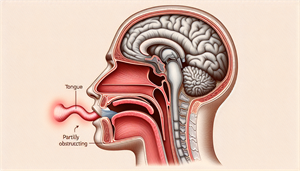Do you find yourself waking up in the middle of the night due to your own snoring? Or perhaps your partner’s loud snoring is preventing you from getting a good night’s sleep? Either way, you’re not alone. Millions of people worldwide struggle with snoring, a common issue that can significantly disrupt sleep quality. The good news is that there are numerous devices available that can help alleviate this problem.
In this blog post, we’ll take you on a journey to better understand the science behind snoring, the various snoring devices available, and how do snoring devices work. We’ll explore the effectiveness of these devices, backed by clinical trials and expert opinions.
Moreover, we’ll guide you on choosing the right snoring device for you, taking into account the severity of your snoring, comfort, and the importance of consulting a sleep specialist. We’ll also look into lifestyle changes that can complement the use of snoring devices.
Key Takeaways
-
Snoring is caused by restricted airflow through breathing passages due to factors including relaxation of throat muscles, anatomical characteristics, lifestyle habits, and sleep position.
-
Devices to combat snoring, such as nasal strips, anti-snoring mouthpieces, and CPAP machines, work by improving airflow and repositioning the jaw or tongue to keep the airway open.
-
The effectiveness of snoring devices varies individually, and combining them with lifestyle changes like weight loss and quitting smoking can significantly improve outcomes.
Understanding Snoring: The Science Behind It
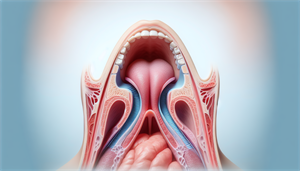
Snoring is a common issue that impacts many people’s sleep quality. The main culprit behind this annoying and sometimes disruptive phenomenon is a restricted airflow through the breathing passages during sleep, often caused by mouth breathing. Various factors can contribute to this restricted airflow, leading to snoring. These can range from anatomical factors and sleep position to certain lifestyle habits.
Understanding snoring begins with the knowledge that our throat muscles relax during sleep. This relaxation, when coupled with a thick soft palate, chronic congestion, obesity, alcohol consumption, or back-sleeping, can limit airflow, producing the notorious snoring sound. There’s no need for despair as numerous treatments for snoring exist, and consulting sleep experts is an excellent initial step. Before that, we’ll examine the causes of snoring in more detail.
Anatomical Factors
Anatomical factors play a significant role in snoring. For instance, if you have enlarged tonsils or a deviated septum, you’re more likely to snore. The size of the tongue can also impact snoring. A larger tongue, especially if it carries excess fat, can partially block the airway while you sleep, leading to snoring. Losing weight and reducing tongue fat volume can help stop snoring and improve sleep apnea.
Another common anatomical factor contributing to snoring is nasal polyps. These small, benign growths can obstruct the sinus passages and block the nose, leading to breathing problems and, consequently, snoring due to nasal obstruction. Considering these anatomical factors is an important step in understanding why you snore and how to address it effectively.
Sleep Position
The position in which you sleep has a significant influence on snoring. For example, back sleepers may find their tongue slipping back into the throat, which narrows the airway and induces snoring. Fear not, as various strategies and devices are available to help you alter your sleep position and reduce snoring.
For example, anti-snore pillows are specifically crafted to provide neck and head support during sleep, discouraging back sleeping and promoting better sleeping posture. Similarly, adjustable beds offer the capability to raise or lower the head and foot, enabling you to sleep with your head elevated while the rest of your body remains in line with the bed. Some back sleepers may need a higher pillow loft to elevate their head and keep their tongue in position. This can help in reducing the risk of obstructive sleep apnea..
A mandibular advancement device can also aid in repositioning the jaw and reducing snoring.
Lifestyle Habits
Lifestyle habits are another crucial factor in snoring. For instance, smoking cigarettes can contribute to snoring and sleep apnea, and quitting smoking may help reduce snoring episodes. Furthermore, alcohol consumption can exacerbate snoring, disrupt sleep patterns, and lead to decreased oxygen levels, impacting sleep quality.
Similarly, obesity can contribute to snoring by causing the presence of neck fat that compresses the upper airway when lying down. In addition, being overweight or obese may lead to excess soft tissue in the mouth and throat, increasing the risk of snoring due to relaxed throat muscles. Therefore, making lifestyle adjustments can help reduce snoring and contribute to a better night’s sleep. Some adjustments to consider include:
-
Losing weight
-
Quitting smoking
-
Cutting down on alcohol
-
Changing sleep position
By implementing these changes and considering sleep medicine, you may be able to reduce snoring and improve your quality of sleep.
Types of Snoring Devices and How They Work
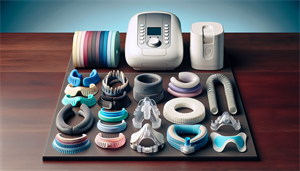
Having examined the causes of snoring, we can now turn our attention to the devices designed to mitigate it. A variety of snoring devices exist, each with its unique approach to the problem. These range from nasal strips and anti-snoring mouthpieces to Continuous Positive Airway Pressure (CPAP) machines, and beyond.
The primary function of these devices is to enhance airflow through the breathing passages. For instance, anti-snoring mouthpieces work by repositioning the jaw, tongue, and soft palate to maintain an open air passage, which in turn improves airflow and decreases snoring.
Next, we will examine these devices and their functioning more thoroughly.
Nasal Strips and Dilators
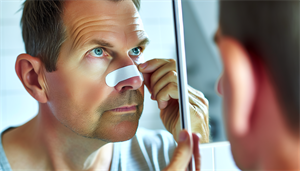
Nasal strips and dilators are designed to enhance airflow through the nasal airway and alleviate snoring resulting from nasal congestion or obstruction. Nasal strips, in particular, are regarded as the most effective for improving nasal airflow and reducing nasal obstruction.
Nasal strips, such as the Breathe Right Nasal Strips, are clear plastic adhesive strips with ‘spring-like’ bands that lift nasal passages to improve airflow. On the other hand, nasal dilators, like the Max-Air Nose Cones device, work by widening the nasal passage to reduce airflow blockage. These devices can greatly improve your sleep quality by reducing snoring. However, it’s important to remember that their effectiveness may vary between individuals.
Anti-Snoring Mouthpieces
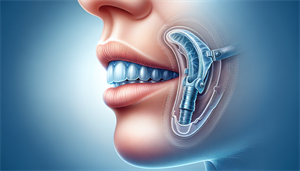
Anti-snoring mouthpieces are another popular option for those seeking to alleviate snoring. There are two main types of these devices: Mandibular Advancement Devices (MADs) and Tongue Retaining Devices (TRDs).
These devices work by repositioning the jaw or tongue to maintain an open airway during sleep, thereby improving airflow and reducing snoring. Anti-snoring mouthpieces can be particularly effective for individuals diagnosed with obstructive sleep apnea, a condition where the airway repeatedly becomes blocked during sleep. However, like all devices, they may not be suitable for everyone and could potentially cause discomfort.
Continuous Positive Airway Pressure (CPAP) Machines

Continuous Positive Airway Pressure (CPAP) Machines are a common treatment for obstructive sleep apnea and snoring. These machines work by delivering pressurized air through a mask, keeping the airway open and reducing the vibrations that cause snoring.
CPAP machines can be highly effective in decreasing the frequency of snoring and alleviating symptoms of severe obstructive sleep apnea. However, they require a doctor’s prescription and may not be suitable for everyone.
Effectiveness of Snoring Devices: What the Research Says
While snoring devices can provide significant relief, their effectiveness can vary based on the individual and the severity of their snoring. This is where research comes in. Several clinical trials and expert reviews have provided valuable insights into the effectiveness of these devices.
Clinical trials have shown that snoring devices can significantly reduce sleep apneas, snoring, and symptoms of restless legs. These devices include:
-
Oral appliances
-
Nasal strips
-
Nasal dilators
-
CPAP machines
These devices have been proven to be effective in reducing snoring and improving sleep by decreasing air resistance in the nasal passages. CPAP machines, in particular, have a success rate estimated to be around 80%.
Clinical Trials and Studies
Clinical trials and studies provide a wealth of information on the effectiveness of various snoring devices. For example, research has demonstrated that CPAP machines can significantly decrease snoring and alleviate symptoms in individuals with severe obstructive sleep apnea. This is done by reducing daytime sleepiness, a common symptom of sleep apnea.
Similarly, research on anti-snoring mouthpieces has shown their effectiveness in treating snoring and sleep apnea. Specifically, oral mandibular advancement devices have been found to improve the accuracy in snoring detection, reduce blood pressure, and are considered one of the most effective solutions for snoring.
Expert Opinions
Expert opinions can provide valuable insights into the effectiveness of snoring devices. Many sleep specialists acknowledge that while snoring devices may offer some benefits to certain individuals, it is crucial for those experiencing chronic snoring to consult a sleep physician for evaluation.
Experts also recognize that nasal strips and dilators can effectively reduce snoring and improve sleep for many individuals. However, like all devices, there are potential disadvantages. Some individuals may find certain devices uncomfortable or ineffective in addressing heavy snoring related to conditions such as obstructive sleep apnea.
Choosing the Right Snoring Device for You
Selecting the appropriate snoring device might seem overwhelming. However, by evaluating the severity of your snoring, the device’s comfort and ease of use, and seeking advice from a sleep specialist, you can identify the most suitable device to yield optimal results.
The intensity of your snoring is a significant factor in deciding the right snoring device. For example, milder cases may find relief with an oral appliance, while devices that stretch the lateral pharyngeal wall may be necessary for more severe cases.
Also, comfort is a significant consideration when choosing a snoring device. It is advisable to opt for a device made from soft, non-irritating materials for maximum comfort, given that you will be wearing it all night.
Assessing the Severity of Your Snoring
Before choosing a snoring device, it’s important to assess the severity of your snoring. Several medical scales, including:
-
Snoring rate
-
Maximal intensity of snoring
-
Snoring index (SI)
-
Epworth Sleepiness Scale (ESS)
-
Mallampati score
-
Apnea-Hypopnea Index (AHI)
A snoring severity assessment can help rate the severity of your loud snoring and determine the need for snoring aids.
You can also assess the intensity and frequency of your snoring at home to provide initial insights into its severity before considering a professional sleep study. A sleep study is conducted to monitor breathing and other body functions overnight, which provides an accurate assessment of the severity of your snoring and helps in diagnosing sleep disorders.
Considering Comfort and Ease of Use
When selecting a snoring device, consider the following factors:
-
Comfort: A device should be comfortable to wear throughout the night.
-
Simplicity of use: Look for a device that is easy to put on and take off.
-
Adjustability: A device that can adjust the position of the jaw and/or tongue can help expand the airway and reduce throat restrictions.
By considering these factors, you can find a snoring device that meets your needs.
Devices that are user-friendly, such as the Coop Home Goods Original Loft Pillow, Rhinomed Mute Nasal Dilator, and Qbcntu Magnetic Anti-Snoring Nose Clips, are examples of anti snoring devices that promote regular use, ultimately increasing the likelihood of reducing snoring.
Consulting a Sleep Specialist
Seeking advice from a sleep specialist is vital when selecting a snoring device. Sleep specialists diagnose and treat a variety of sleep disorders, including sleep disorder conditions such as:
-
Snoring
-
Sleep apnea
-
Insomnia
-
Narcolepsy
-
Restless leg syndrome
A sleep specialist can assist in the selection of the correct snoring device by evaluating for Obstructive Sleep Apnea (OSA) and recommending the most suitable anti-snoring device according to the individual’s specific condition. Therefore, if excessive snoring is affecting your sleep, it is advisable to consult with a sleep specialist.
Lifestyle Changes to Complement Snoring Devices
Although snoring devices can offer substantial relief, lifestyle modifications can also significantly reduce snoring. Changes such as weight loss, quitting smoking, and adjusting sleep position can help diminish snoring and enhance sleep quality.
These lifestyle modifications not only reduce snoring but also yield numerous other health benefits. As such, it’s beneficial to consider these strategies in conjunction with snoring devices to enhance your sleep quality.
Weight Loss
Weight loss can aid in reducing snoring by lowering the risk of obstructive sleep apnea and decreasing the size of throat and jaw muscles. Obesity can contribute to snoring by causing the presence of neck fat that compresses the upper airway, and it may also lead to excess soft tissue in the mouth and throat, increasing the risk of snoring.
Studies have indicated that even a modest weight loss of 5 to 8 pounds can positively affect snoring and lessen symptoms of obstructive sleep apnea. Hence, if you’re overweight and dealing with snoring, it might be useful to consider a healthy weight loss plan.
Quitting Smoking
Quitting smoking is vital for individuals who snore. Cigarette smoke irritates the lining membranes of the airways, causing congestion and reducing the opening in the upper airways, which can lead to snoring.
Research has shown that after quitting smoking, snoring can decrease and the severity of sleep-related conditions can reduce. It may take up to four years for snoring prevalence to decline to the level of someone who has never smoked.
Hence, if you’re a smoker dealing with snoring, quitting smoking should be part of your plan to enhance sleep quality.
Adjusting Sleep Position
Modifying your sleep position can also aid in reducing snoring. Side sleeping can avert the blockage and collapse of the airway, often caused by back sleeping, which leads to intensified snoring.
In addition to reducing snoring, adjusting your sleep position can also lead to improved sleep quality by promoting healthy spine alignment, relieving stress on the spine and neck, and reducing occurrences of sleep apnea. Specialized pillows can also promote side sleeping, which in turn can reduce snoring.
Summary
We’ve covered a lot of ground in this blog post. We’ve explored the science behind snoring, the various snoring devices available and how they work, the effectiveness of these devices, and how to choose the right one for you. We’ve also looked into lifestyle changes that can complement the use of snoring devices.
While snoring can be a nuisance, remember that there are numerous strategies and devices available to help alleviate this problem. Whether you decide to use a snoring device, make lifestyle changes, or both, the most important step is to take action. Don’t let snoring rob you of a good night’s sleep. You deserve restful, uninterrupted sleep, and with the right approach, it’s entirely within your reach.
Frequently Asked Questions
Do anti-snoring devices actually work?
Yes, anti-snoring devices can work for some people by providing relief or improvement, though there's no guarantee it will work for everyone.
What is the best thing to stop snoring?
To stop snoring, try sleeping on your side, using nasal strips, or a mouthpiece. Lifestyle changes like weight loss, mouth exercises, and avoiding alcohol can also help.
Does the anti snore wristband really work?
No, the anti-snore wristband does not work to stop snoring, despite being marketed as a solution. It's best to avoid wrist bands or electronic shock bracelets for this purpose.
What causes snoring?
Snoring is typically caused by a restricted airflow through the breathing passages during sleep, which can be influenced by factors such as anatomical issues, sleep position, and lifestyle habits.
How can I choose the right snoring device?
Consider the severity of your snoring, the comfort and ease of use of the device, and consult a sleep specialist to choose the right snoring device.

